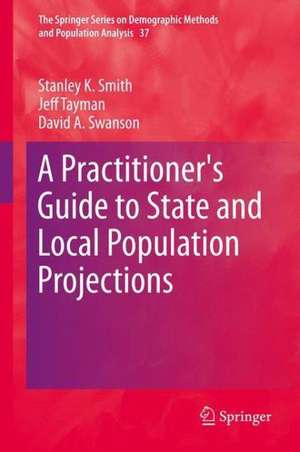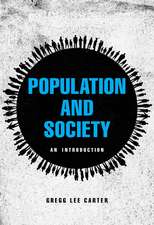A Practitioner's Guide to State and Local Population Projections: The Springer Series on Demographic Methods and Population Analysis, cartea 37
Autor Stanley K. Smith, Jeff Tayman, David A. Swansonen Limba Engleză Hardback – 3 ian 2014
| Toate formatele și edițiile | Preț | Express |
|---|---|---|
| Paperback (1) | 787.29 lei 6-8 săpt. | |
| SPRINGER NETHERLANDS – 17 sep 2016 | 787.29 lei 6-8 săpt. | |
| Hardback (1) | 793.44 lei 6-8 săpt. | |
| SPRINGER NETHERLANDS – 3 ian 2014 | 793.44 lei 6-8 săpt. |
Din seria The Springer Series on Demographic Methods and Population Analysis
- 18%
 Preț: 951.14 lei
Preț: 951.14 lei - 15%
 Preț: 643.99 lei
Preț: 643.99 lei - 15%
 Preț: 643.16 lei
Preț: 643.16 lei - 18%
 Preț: 955.56 lei
Preț: 955.56 lei - 18%
 Preț: 952.40 lei
Preț: 952.40 lei -
 Preț: 393.90 lei
Preț: 393.90 lei -
 Preț: 393.74 lei
Preț: 393.74 lei - 15%
 Preț: 639.08 lei
Preț: 639.08 lei - 18%
 Preț: 952.89 lei
Preț: 952.89 lei - 18%
 Preț: 1118.45 lei
Preț: 1118.45 lei -
 Preț: 402.17 lei
Preț: 402.17 lei - 18%
 Preț: 953.82 lei
Preț: 953.82 lei - 15%
 Preț: 644.30 lei
Preț: 644.30 lei - 15%
 Preț: 663.93 lei
Preț: 663.93 lei - 18%
 Preț: 1380.95 lei
Preț: 1380.95 lei - 18%
 Preț: 953.65 lei
Preț: 953.65 lei - 18%
 Preț: 949.42 lei
Preț: 949.42 lei - 15%
 Preț: 644.82 lei
Preț: 644.82 lei - 18%
 Preț: 953.03 lei
Preț: 953.03 lei - 18%
 Preț: 952.09 lei
Preț: 952.09 lei - 15%
 Preț: 643.65 lei
Preț: 643.65 lei - 15%
 Preț: 643.99 lei
Preț: 643.99 lei - 15%
 Preț: 644.82 lei
Preț: 644.82 lei - 15%
 Preț: 642.51 lei
Preț: 642.51 lei - 15%
 Preț: 644.95 lei
Preț: 644.95 lei - 15%
 Preț: 635.62 lei
Preț: 635.62 lei
Preț: 793.44 lei
Preț vechi: 967.62 lei
-18% Nou
Puncte Express: 1190
Preț estimativ în valută:
151.83€ • 162.35$ • 126.59£
151.83€ • 162.35$ • 126.59£
Carte tipărită la comandă
Livrare economică 17 aprilie-01 mai
Preluare comenzi: 021 569.72.76
Specificații
ISBN-13: 9789400775503
ISBN-10: 9400775504
Pagini: 450
Ilustrații: XV, 411 p. 26 illus.
Dimensiuni: 155 x 235 x 30 mm
Greutate: 0.77 kg
Ediția:2013
Editura: SPRINGER NETHERLANDS
Colecția Springer
Seria The Springer Series on Demographic Methods and Population Analysis
Locul publicării:Dordrecht, Netherlands
ISBN-10: 9400775504
Pagini: 450
Ilustrații: XV, 411 p. 26 illus.
Dimensiuni: 155 x 235 x 30 mm
Greutate: 0.77 kg
Ediția:2013
Editura: SPRINGER NETHERLANDS
Colecția Springer
Seria The Springer Series on Demographic Methods and Population Analysis
Locul publicării:Dordrecht, Netherlands
Public țintă
ResearchCuprins
Chapter 1: Rationale, Terminology, Scope.- Chapter 2: Fundamental of Population Analysis.- Chapter 3: Overview of the Cohort-Component Method.- Chapter 4: Mortality.- Chapter 5: fertility.- Chapter 6: Migration.- Chapter 7: Implementing the Cohort-Component Method.- Chapter 8: Extrapolation Methods.- Chapter 9: Structural and Microsimulation Models.- Chapter 10: Special Adjustments.- Chapter 11: Related Projections.- Chapter 12: Evaluating Projections.- Chapter 13 Forecast Accuracy and Bias.- Chapter 14: A Practical Guide to Small-Area Projections.- Epilogues: Some Final Thoughts.- Glossary.- Index.
Recenzii
“In fourteen chapters it provides thereader with the necessary tools for creating numerous population projectionmethods. … both graduate and upper-level undergraduate students could use thisbook as the sole textbook for a course, or as a supplement focusing on selectchapters. Similarly, those who need a refresher on specific projectionfundamentals will find this book full of helpful information. … Reading thisbook is an eye-opening journey into the complex world of populationprojections/forecasts.” (Alison Yacyshyn, Canadian Studies in population, Vol. 42(3-4), 2015)
Textul de pe ultima copertă
This book focuses on the methodology and analysis of state and local population projections. It describes the most commonly used data sources and application techniques for four types of projection methods: cohort-component, trend extrapolation, structural models, and microsimulation. It covers the components of population growth, sources of data, the formation of assumptions, the development of evaluation criteria, and the determinants of forecast accuracy. It considers the strengths and weaknesses of various projection methods and pays special attention to the unique problems that characterize small-area projections. The authors provide practical guidance to demographers, planners, market analysts, and others called on to construct state and local population projections. They use many examples and illustrations and present suggestions for dealing with special populations, unique circumstances, and inadequate or unreliable data. They describe techniques for controlling one set of projections to another, for interpolating between time points, for sub-dividing age groups, and for constructing projections of population-related variables (e.g., school enrollment, households). They discuss the role of judgment and the importance of the political context in which projections are made. They emphasize the “utility” of projections, or their usefulness for decision making in a world of competing demands and limited resources. This comprehensive book will provide readers with an understanding not only of the mechanics of the most commonly used population projection methods, but also of the many complex issues affecting their construction, interpretation, evaluation, and use.
Caracteristici
Covers both the methodology and analysis of population projections Includes projections of population-related variables (e.g., school enrollment) Focuses on problems unique to small areas










